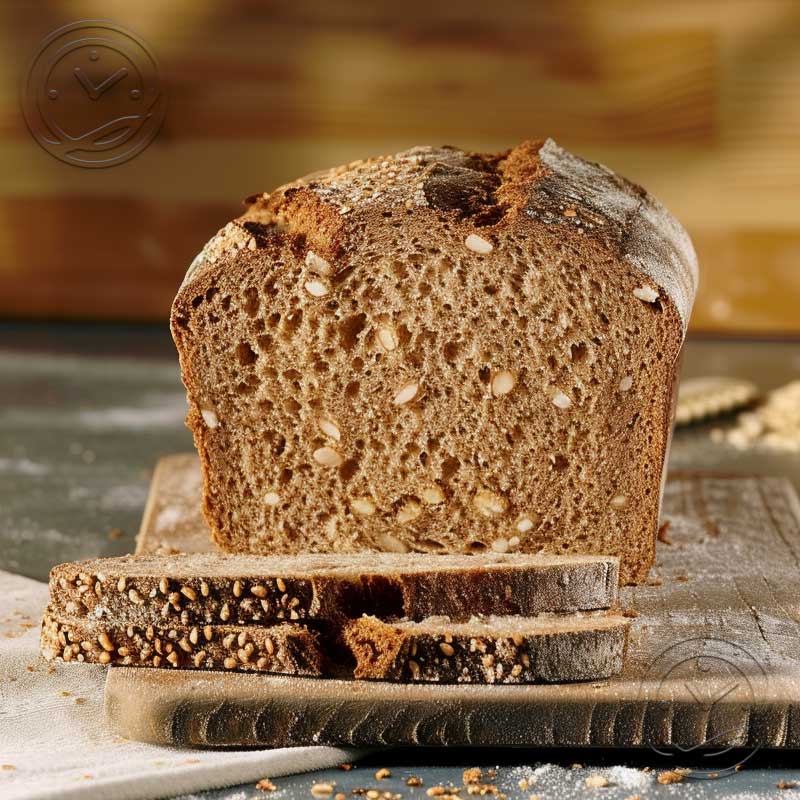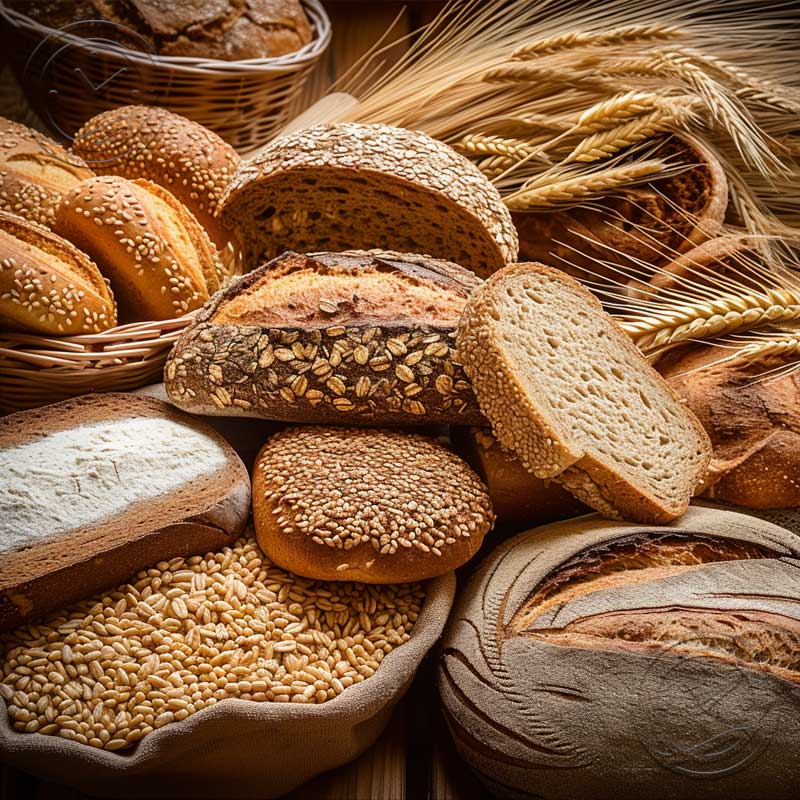What is the Mediterranean diet?
The Mediterranean diet is a healthy eating pattern that is based on the traditional foods of countries bordering the Mediterranean Sea.
It is characterized by high intakes of fruits, vegetables, whole grains, nuts, seeds, and olive oil, and moderate intakes of fish, poultry, and dairy products.
The Mediterranean diet is also low in red meat, processed foods, and sugary drinks.
The Mediterranean diet has been linked to a number of health benefits, including reduced risk of heart disease, stroke, type 2 diabetes, and some types of cancer.
It is also associated with improved cognitive function and longevity.
- History of the Mediterranean diet
- Key principles of the Mediterranean diet
- Foods that are typically included in the Mediterranean diet
Can you eat bread on the Mediterranean diet?
Yes, you can eat bread on the Mediterranean diet.
In fact, bread is a staple food of the Mediterranean diet, and it is often made from whole grains, which are a healthy choice.
There are many different types of bread that are allowed on the Mediterranean diet, including whole-wheat bread, sourdough bread, and pita bread.
These breads are all high in fiber and nutrients, and they can help you feel full and satisfied after eating.
In addition, bread can be a good source of whole grains, which are a type of carbohydrate that is slowly digested and absorbed into the body.
This can help to keep you feeling full and satisfied after eating, and it can also help to stabilize blood sugar levels.
However, it is important to note that not all breads are created equal.
Some breads are high in unhealthy fats, sugar, and calories, and these breads should be avoided on the Mediterranean diet.
When choosing bread, look for breads that are made from whole grains and that are low in unhealthy fats, sugar, and calories.
Whole-wheat bread, sourdough bread, and pita bread are all good choices.
Overall, bread can be a healthy part of the Mediterranean diet.
Just be sure to choose breads that are made from whole grains and that are low in unhealthy fats, sugar, and calories.
4 Mediterranean Diet Butter Substitute
Unlock the secrets to a healthier, more vibrant life with our Mediterranean Diet Butter Substitute guide. Delve into the world-renowned…
Types of bread allowed on the Mediterranean diet
The Mediterranean diet is a healthy eating pattern that is based on the traditional foods of the countries bordering the Mediterranean Sea.
This diet is rich in fruits, vegetables, whole grains, and healthy fats, and it is low in processed foods and added sugars.
Bread is an important part of the Mediterranean diet, and there are many different types of bread that are allowed on this diet.

- Whole-wheat bread is made from 100% whole-wheat flour, which is a good source of fiber, vitamins, and minerals. Whole-wheat bread is a healthy choice for the Mediterranean diet.
- Barley bread is made from barley flour, which is a good source of fiber and protein. Barley bread is a healthy choice for the Mediterranean diet.
- Oat bread is made from oat flour, which is a good source of fiber and beta-glucan. Oat bread is a healthy choice for the Mediterranean diet.
- Rye bread is made from rye flour, which is a good source of fiber and protein. Rye bread is a healthy choice for the Mediterranean diet.
- Multigrain bread is made from a variety of different grains, such as wheat, barley, oats, and rye. Multigrain bread is a healthy choice for the Mediterranean diet.
These are just a few of the many types of bread that are allowed on the Mediterranean diet.
Bread is an important part of this diet, and it can be enjoyed in moderation as part of a healthy lifestyle.
Benefits
Bread is a staple of the Mediterranean diet, and for good reason.
Whole-wheat bread is a good source of fiber, protein, and vitamins and minerals.
It can also help you maintain a healthy weight, reduce your risk of heart disease, and improve your digestive health.
- Helps you maintain a healthy weight: Whole-wheat bread is a good source of fiber, which can help you feel full and satisfied after eating. This can help you avoid overeating and maintain a healthy weight.
- Reduces your risk of heart disease: Whole-wheat bread is a good source of heart-healthy nutrients, including fiber, magnesium, and potassium. These nutrients can help to lower your blood pressure and cholesterol levels, and reduce your risk of heart disease.
- Improves your digestive health: Whole-wheat bread is a good source of fiber, which can help to improve your digestive health. Fiber helps to move food through your digestive system and prevent constipation.
Of course, not all bread is created equal.
Some breads are made with refined flour, which is stripped of its nutrients.
These breads are not as healthy as whole-wheat bread and should be avoided on the Mediterranean diet.
If you’re looking for a healthy and delicious way to add bread to your Mediterranean diet, choose whole-wheat bread made with minimally processed ingredients.
Enjoy a slice of whole-wheat bread with your morning meal, with a soup or salad for lunch, or as a side dish with dinner.
5 Must-Try Mediterranean Diet Coffee Recipes
Dive into the soul-stirring essence of Mediterranean coffee culture with "5 Must-Try Mediterranean Diet Coffee Recipes." Beyond a mere beverage,…
Risks
While bread can be a part of a healthy diet, there are some potential risks associated with eating it, including its ability to contribute to weight gain and its high glycemic index.
- Weight gain: Bread is a high-calorie food, and eating too much of it can lead to weight gain. The Mediterranean diet is not a low-calorie diet, but it is designed to help you maintain a healthy weight by focusing on whole, unprocessed foods.
- High glycemic index: Bread has a high glycemic index, which means that it causes blood sugar levels to rise quickly. This can lead to spikes in insulin levels, which can increase the risk of type 2 diabetes and other health problems.
It is important to note that not all breads are created equal.
Some breads are made with refined flour, which is a high-glycemic carbohydrate, while others are made with whole grains, which are a low-glycemic carbohydrate.
Whole-grain breads are a healthier option than refined-grain breads, and they are also a good source of fiber, which can help to slow down the absorption of sugar into the bloodstream.
If you are concerned about the potential risks of eating bread, you can choose to limit your intake or opt for whole-grain breads instead of refined-grain breads.
You can also try to make your own bread at home, using whole-grain flour and other healthy ingredients.
How much bread should you eat?
The Mediterranean diet is a healthy eating pattern that is based on the traditional foods of countries in the Mediterranean region.
It is rich in fruits, vegetables, whole grains, and healthy fats, and it is low in processed foods and added sugars.
Bread is a staple food in the Mediterranean diet, and it is typically made from whole grains.
Whole-grain bread is a good source of fiber, vitamins, and minerals, and it can help you feel full and satisfied after eating.
The amount of bread you should eat on the Mediterranean diet depends on your individual needs and preferences.
If you are trying to lose weight, you may want to limit your intake of bread to one or two servings per day.
If you are not trying to lose weight, you can enjoy more bread, but it is important to choose whole-grain varieties over refined breads.
Here are some general guidelines for how much bread you should eat on the Mediterranean diet:
- Women should eat no more than three servings of bread per day.
- Men should eat no more than four servings of bread per day.
- Children should eat one to two servings of bread per day.
It is important to remember that the Mediterranean diet is a flexible eating pattern, and you can adjust the amount of bread you eat to fit your individual needs and preferences.
Indulge in a tantalizing twist on traditional tacos with DASH Diet Tacos. Elevate your favorite flavors while nurturing your heart…
Conclusion
In conclusion, bread is allowed on the Mediterranean diet, but it should be consumed in moderation.
Whole-grain bread is the best choice, as it is higher in fiber and nutrients than white bread.
Eating bread in moderation can help you maintain a healthy weight and reduce your risk of chronic diseases.
If you are following the Mediterranean diet, you should limit your intake of bread to one or two servings per day.
Each serving should be about 1-2 ounces of bread.
Here are some tips for incorporating bread into your Mediterranean diet:
- Choose whole-grain bread over white bread.
- Limit your intake of bread to one or two servings per day.
- Enjoy bread with healthy toppings, such as olive oil, avocado, or tomato.
- Make your own bread at home using whole-wheat flour.
By following these tips, you can enjoy bread on the Mediterranean diet and still maintain a healthy weight and reduce your risk of chronic diseases.
FAQ
Q: Can I eat bread on the Mediterranean diet?
A: Yes, you can eat bread on the Mediterranean diet. However, it is important to choose whole-wheat bread over white bread. Whole-wheat bread is a good source of fiber, which can help you feel full and satisfied after eating. It is also a good source of vitamins and minerals, such as iron, magnesium, and zinc.
Q: What types of bread are allowed on the Mediterranean diet?
A: Whole-wheat bread, sourdough bread, and multigrain bread are all good choices for the Mediterranean diet. These types of bread are made with whole grains, which are a good source of fiber and nutrients.
Q: How much bread should I eat on the Mediterranean diet?
A: It is recommended to eat 2-3 servings of whole-wheat bread per day on the Mediterranean diet. A serving is about 1 slice of bread.
Q: Are there any risks associated with eating bread on the Mediterranean diet?
A: There are no known risks associated with eating bread on the Mediterranean diet. However, it is important to choose whole-wheat bread over white bread. White bread is a refined grain product that is high in calories and low in nutrients.
Q: Can I eat bread on the Mediterranean diet if I have diabetes?
A: Yes, you can eat bread on the Mediterranean diet if you have diabetes. However, it is important to choose whole-wheat bread over white bread. Whole-wheat bread is a good source of fiber, which can help you control your blood sugar levels.
Q: Can I eat bread on the Mediterranean diet if I am gluten-free?
A: Yes, you can eat bread on the Mediterranean diet if you are gluten-free. There are many gluten-free bread options available on the market.






